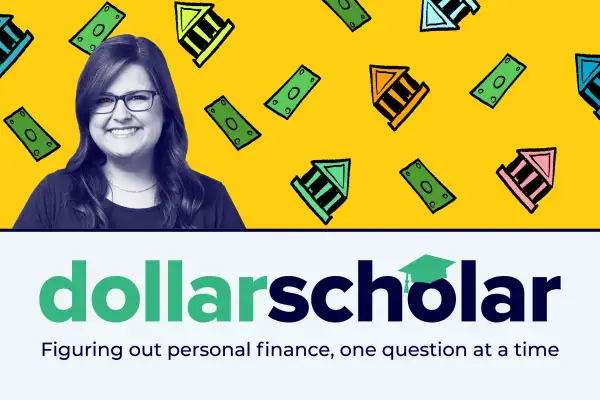Dollar Scholar Asks: What Is Open Banking, and How Could It Benefit Me?

This is an excerpt from Dollar Scholar, the Money newsletter where news editor Julia Glum teaches you the modern money lessons you NEED to know. Don't miss the next issue! Sign up at money.com/subscribe and join our community of 160,000+ Scholars.
I’ve long joked that Money should just deposit my paycheck directly into the coffers of Madison Square Garden. I go to so many concerts there that it seems like a logical arrangement! Think about how much more efficient it would be if we skipped the middleman — me — and handed over my wages to the place I’m going to spend them all anyway.
This is mostly a self-own, but it’s not an outlandish idea. It's actually similar to a movement happening right now called open banking, which involves connecting various financial accounts for better money management.
My Money-MSG partnership proposal aside, I want to learn more.
What is open banking?
Shaun Vanderkaap, vice president of strategy for payments startup Link Money, tells me open banking is what happens when an account owner gives permission for third-party service providers like budgeting apps or investment platforms to access their financial data. The term “open banking,” therefore, refers to banks opening up their application programming interfaces, or APIs.
(Bear with me, I promise this is about to get interesting.)
It all has to do with the value — and use — of my bank data, says Dee Choubey, the co-founder and CEO of fintech company MoneyLion, which has a mobile app and lending arm.
“Not even that long ago, that data was walled,” he says. “Where you were spending on your credit card, where you were spending on your debit card, whether you're taking money out of your ATM, all of that data was … sitting inside a [bank] server somewhere.”
Because of this, the data was effectively locked up; the banks had a monopoly on it. But then people began to realize that if they gave permission to share their transactions, software applications could provide insights into their spending habits.
A good example of this was Mint (RIP): I hooked it up to my Bank of America accounts way back in 2016, and for years it kept track of my spending by automatically sorting my transactions into categories like Clothing, Air Travel and Cash & ATM.
“Basically anytime you're linking your bank account [to something] is open banking,” Vanderkaap says.
Initially, these sorts of services were limited to screen scraping, or basically getting a person’s login info, going onto their bank website and copying the HTML so they could parse the contents. But “the banks got annoyed,” Choubey adds, because third parties were taking valuable data without paying for it. Screen scraping also wasn’t super secure.
This gave rise to a debate: Who truly owns someone’s bank data? Is it me (the customer) or the financial institution that I use?
The government got involved, and, last fall, the Consumer Financial Protection Bureau formally proposed a rule that would forbid financial institutions from “hoarding” my data.
It would require companies to hand over my data if authorized, prohibit the receiving entities “from misusing or wrongfully monetizing” it, and allow me to revoke access if I change my mind. The CFPB rule would also push open banking towards shared APIs and away from screen scraping.
With more advanced systems and control over my own financial data, Choubey says I’m able to do so much more.
Forget stodgy bank websites — I can use sleek apps that let me view my account history in dark mode, for instance, or answer hyper-specific questions about how much I spent on Lyft in a specific month and give recommendations about which subscriptions to cancel.
I can effectively monetize my shopping by turning my data over to a company like Fetch, which will give it to advertisers that offer me better, more targeted rewards. I can link my crypto wallet to my bank account for smoother transfers; I can use aggregators to better represent my financial history in loan applications.
Beyond that, Vanderkaap says the next evolution in U.S. open banking is account-to-account payments. If I’m on the website for a retailer, for instance, I’ll be able to pay with my bank account instead of a credit card. Companies like Airbnb and Uber already offer this through Stripe, and it’s only going to expand.
Merchants like open banking because they can save money on transaction fees, but it’s smart from a budgeting angle, too. Vanderkaap compares it to the envelope (or cash stuffing) method.
“This is a way of doing that in an e-commerce environment — you're only spending the money that you have,” he says. “You don't incur any late fees; you don't incur any interest. You're not running up debt because the funds are coming directly out of your bank account.”
The bottom line
Open banking involves using my own financial data outside of the bank for money management. With control in my own hands and advances in security, open banking is a trend that’s likely only going to get more popular.
“The power is going to be in the hands of the consumers,” Choubey says. “Open banking is just the beginning, and it's going to permeate just about every data source that we have out there.”
More from Money:
Dollar Scholar Asks: Is My Bank Account Number a Secret?
I Was Skeptical of Online Banks — Until Experts Showed Me Their Money-Saving Potential

